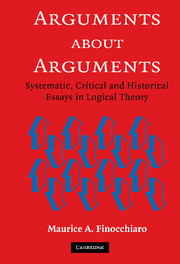Book contents
- Frontmatter
- Contents
- Preface and Acknowledgments
- Introduction : An Approach to a Branch of Logic
- Theorizing about reasoning and argument
- Fallacies and asymmetries
- Critiques
- 10 Siegel on Critical Thinking : Reasoning versus Rationality versus Criticism (1989)
- 11 Induction and Intuition in the Normative Study of Reasoning : Cohen on Inductive Reasoning in Philosophy (1991)
- 12 Logic, Politics, and Gramsci
- 13 The Dialectical Approach to Interpretation and Evaluation : From Axiom to Dialogue (Barth) and from Structure to Dialogue (Freeman) (1995)
- 14 The Port-Royal Logic's Theory of Argument
- 15 A Critique of the Dialectical Approach, Part Ⅱ : The Amsterdam School and Walton on Complex Dialogues (1999)
- 16 Valid Ad Hominem Arguments in Philosophy
- 17 Dialectics, Evaluation, and Argument : Goldman and Johnson on the Concept of Argument (2003)
- Historical analyses
- Selected Bibliography
- Index
10 - Siegel on Critical Thinking : Reasoning versus Rationality versus Criticism (1989)
from Critiques
Published online by Cambridge University Press: 05 February 2015
- Frontmatter
- Contents
- Preface and Acknowledgments
- Introduction : An Approach to a Branch of Logic
- Theorizing about reasoning and argument
- Fallacies and asymmetries
- Critiques
- 10 Siegel on Critical Thinking : Reasoning versus Rationality versus Criticism (1989)
- 11 Induction and Intuition in the Normative Study of Reasoning : Cohen on Inductive Reasoning in Philosophy (1991)
- 12 Logic, Politics, and Gramsci
- 13 The Dialectical Approach to Interpretation and Evaluation : From Axiom to Dialogue (Barth) and from Structure to Dialogue (Freeman) (1995)
- 14 The Port-Royal Logic's Theory of Argument
- 15 A Critique of the Dialectical Approach, Part Ⅱ : The Amsterdam School and Walton on Complex Dialogues (1999)
- 16 Valid Ad Hominem Arguments in Philosophy
- 17 Dialectics, Evaluation, and Argument : Goldman and Johnson on the Concept of Argument (2003)
- Historical analyses
- Selected Bibliography
- Index
Summary
The ‘Reasons’ Conception of Critical Thinking
Although the practice of critical thinking goes back at least to the time of Socrates, and the theory of it at least to 1941 with the publication of Edward M. Glaser's An Experiment in the Development of Critical Thinking, the phenomenon has now acquired some of the trappings of a “movement,” and in fact some of its leading exponents do not hesitate to speak of it by using this label (Paul 1985). Interest in critical thinking has always had, and continues to have a strong pedagogical orientation (Ennis 1962, 1980, 1981; McPeck 1981; Paul 1982, 1984, 1985), but recently the phenomenon has begun to receive epistemological and methodological scrutiny. An excellent example of this relatively novel approach to critical thinking is Harvey Siegel's book Educating Reason: Rationality, Critical Thinking, and Education (1988). This work moves the discussion of critical thinking to a qualitatively higher level of sophistication, and it does so with intelligence, breadth of preparation, and a touch of inspired zeal. We therefore have two sets of reasons for paying attention to this work.
The focus of Siegel's book is the notion of critical thinking, which gives it the following structure. He begins with an account and constructive criticism of three conceptions of critical thinking, those of Robert Ennis, Richard Paul, and John McPeck. These lead to Siegel's own account, which he calls the ‘reasons’ conception, and which he articulates primarily in terms of reason assessment and the practice of the critical spirit.
- Type
- Chapter
- Information
- Arguments about ArgumentsSystematic, Critical, and Historical Essays In Logical Theory, pp. 181 - 192Publisher: Cambridge University PressPrint publication year: 2005



